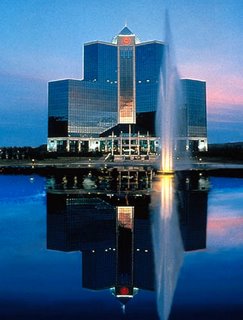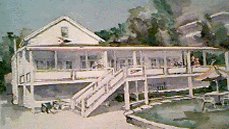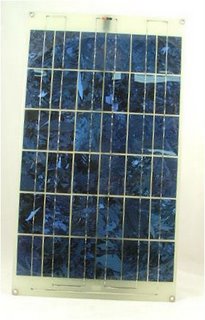 Right.
Right.Sunday Feb. 5th was the annual Hudson Cove Yacht Club brunch. It was held in the Sheraton Crossroads in Mahwah, NJ - which I jokingly refer to as Darth Vader's summer home. The picture doesn't really capture the lurking blackness of the building properly. But the brunch was really good -the spread was HUGE! If you couldn't find something to eat there, you were in deep trouble.
Most of the usual group of suspects were rounded up for the do, except for Bobbie and Warren who had gone away. Needless to say, I ate myself nearly sick. It was wonderful!
I've decided to leave Harbor House Marina in Stamford, CT because they raised their price to $100/ft. with a 40 ft. minimum. That means an additional $600 for nothing. Not that there was a lot there to begin with. I won't go into it any further but it's so very clear that the owners are not boaters. Oddly enough, the marina manager is. But let me stop here before I rant. Who knows, I may hit the lottery and want to go back there.
So, I figure I'll go back to City Island. It's a very nice place, and I know people there. For years I kept my boat at Barron's Boat Yard - John Barron is a good guy and very easygoing. We've sailed together, partied together and so forth.
The yard has moorings and a single work dock. He can haul and do any work including topside painting. Currently he and his son, Jason, are working the yard (with help of course). He's very meticulous about maintaining his moorings and regularly checks his customers boats.
The yard is on the east side of City Island just north of the ferry landing to Hart Island. So it's well protected in all but strong nor'easters. The disadvantage is that it's a working yard. Launch service hours are basically normal working hours and weekend traffic in power and party boats to New Rochelle is horrible.
The advantages are that the yard is inexpensive and friendly. Also: if you come back late, you can leave your boat on the dock and John's crew will put it back on the mooring the next morning.
 On the other hand, there are some very nice yacht clubs on City Island, such as the Harlem Yacht Club and the City Island Yacht Club. I've decided to join City Island Yacht Club because they seem more in line with my less than formal attitudes. Harlem seems too formal, too old. I could be wrong. But there you have it.
On the other hand, there are some very nice yacht clubs on City Island, such as the Harlem Yacht Club and the City Island Yacht Club. I've decided to join City Island Yacht Club because they seem more in line with my less than formal attitudes. Harlem seems too formal, too old. I could be wrong. But there you have it.Anyway, last year I bought an Engle portable refrigerator/freezer which I love - it's efficient (.7 amp draw as a refrigerator, 2.3 as a freezer), quite nicely built, quiet, and not too heavy. It's a fair sized 35 qt. It holds enough packed properly for my usual 2 week summer cruise. But it does draw power.
Last summer, I experimented with it and found I could run the thing overnight and the stereo and my lighting and still start the engine with the same battery the next morning. I carry two group 31 deep cycle flooded batteries, so with one in reserve, all's good. But it takes an hour of motoring to fully charge the battery afterwards. Normally, this isn't a problem since every afternoon the wind dies and if I'm going somewhere, I have to motor.
But at a mooring, I'd like to be able to leave the boat with the refrig on for extended periods without draining the battery - the reefer has a low voltage cut-off, but if there's food in it, that's the end of that. And I hate touching rotted whatever! Also, there is a great feeling in being energy independent - even if the motor doesn't, can't or won't run, I'll still have power for instruments, refer, and autopilot.
Towards this goal, my first idea was to go solar - I have a space on the seahood that will hold two 22 watt solar panels from Sundance Solar in Warner, NH. I've searched the web pretty thouroughly and they've had the best overall pricing. In fact, my friend Dale who is now living on the side of a mountain in Maui, Hawaii, is using a similar setup that I recommended.
Anyway, they have the panels and since each will put out 1.5 amps at optimal sunlight, I figured to run the refer and keep the batteries charged, they'd average about 1/3 - or .5 amp each. Two gives me 1 amp, which powers the refer and leaves .3 amp for charging. Since the nights are short in the summer and the sun brighter, I'd expect this set up to work for several weeks at a time before the low voltage cut-off kicked in. The price for this setup including the two panels and the charge controller is about $550. You absolutely need the controller.
My friend Herb (of Herb and Gina fame) also has a rebuilt Balmar alternator that I think is 100 amp - significantly larger than my current 35 amp one - that he's willing to give me. This would be great, because it could reduce the engine run time to charge the batteries.
But we all know that as soon as you put one piece of gear on a boat, you want another and that changes the energy balance, and so on and so on. I thought about this for a bit and decided to call Jack Rabbit Marine (who you'll see in the left column now as a marine electrical system supplier). I spoke at length with Steven Ivers, a certified ABYC Marine Electrical person.
What he recommended was changing my electrical system to provide for separation of the starting battery and the house bank. In addition he recommended an Echo Charger to manage the batterys properly. He also provided a simplified diagram for how this could be accomplished. If you are thinking of upgrading your electrical system on your boat, these people (Jack Rabbit Marine) are your go-to guys. I heartily recommend them.
 They also have a terrific wind generator package if you're doing costal sailing. It's the new Air-x 400 with mounting pole for less than $1000. Very nice.
They also have a terrific wind generator package if you're doing costal sailing. It's the new Air-x 400 with mounting pole for less than $1000. Very nice.Anyway, I've ordered the two solar panels and we'll see where that leads... Next week will be interesting, and I hope warm enough to either sail or to check the mounting/fitting of the panels.
See you on the water!


No comments:
Post a Comment